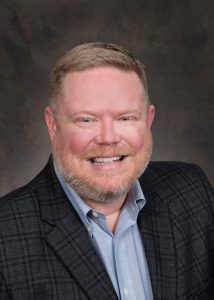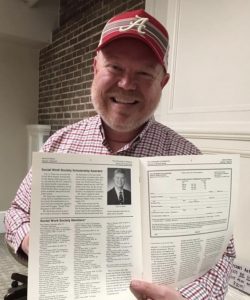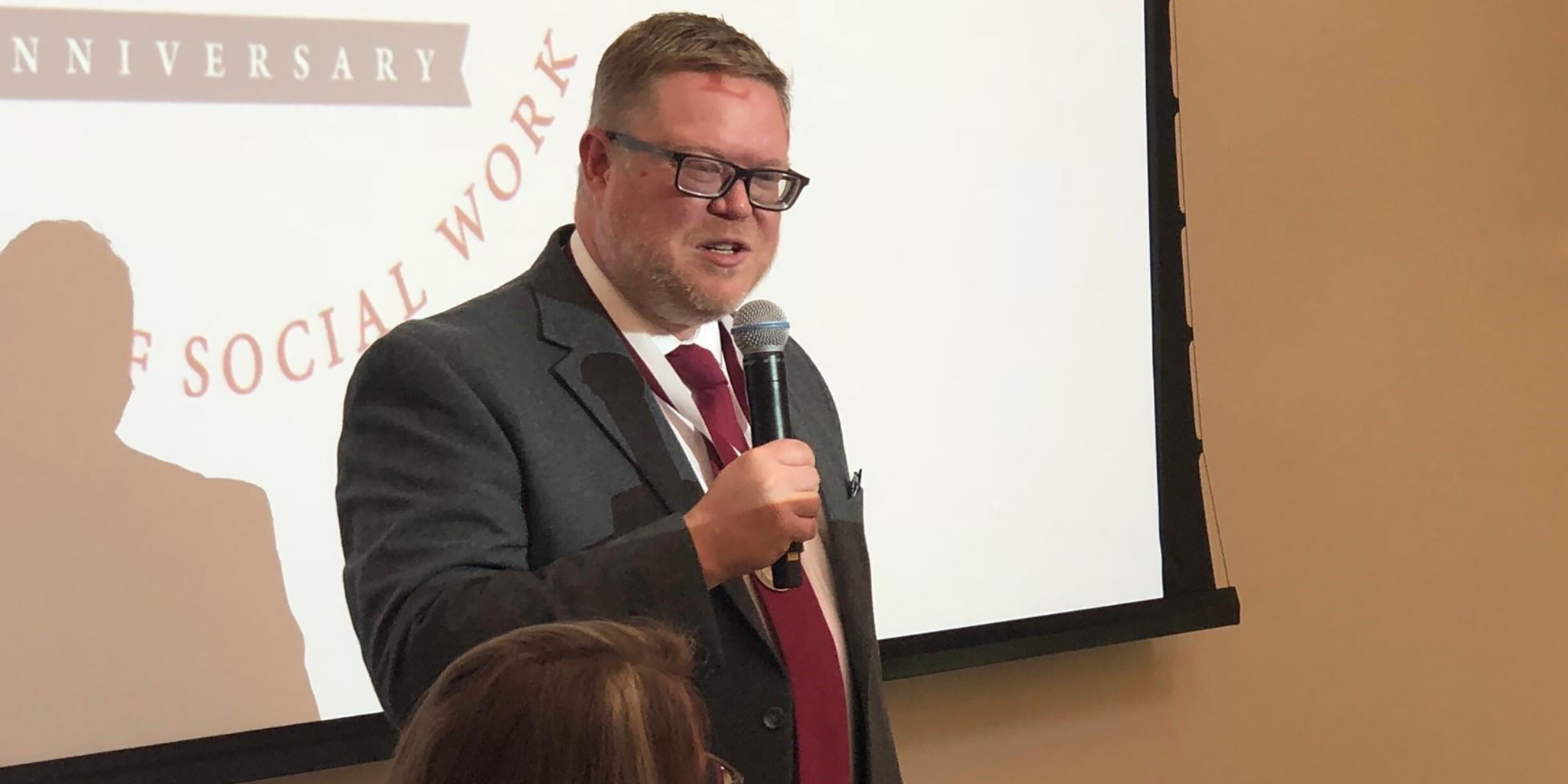Gilead Sciences VP keen to ‘nurture’ critical alumni support system for students
May 29, 2020
By David Miller

Coy Stout, who earned his MSW at UA in 1994, has worked for Gilead Sciences, Inc. since 2004.
Coy Stout was working through his undergraduate degree at a feverish pace, hoping to graduate early from the University of Alabama and minimize his student debt.
He’d planned to attend medical school and focused on the hard sciences like biology and chemistry. Stout had his heart set on helping people, but “not necessarily in medicine.”
Stout was on track to earn a degree in psychology by the summer of 1992, just three years after first enrolling at UA. His career direction still unclear, an elective class during his final year would bring his passion into focus and set his course for the next 25 years of practice and macro social work.
The elective, an intro to social work course taught by Dr. Lucinda Roff, dean of the UA School of Social Work at the time, was both revealing and inspiring for Stout.
“[Roff] did a terrific job to help me see the variety of ways that social work changes communities,” Stout said. “I had preconceived notions of social workers and the traditional roles they’ve had in social safety nets and child welfare. This class helped me see how they impact policy and healthcare.”
Stout would earn his MSW from UA in 1994 before doing case work and program administration in the Washington, D.C. metro area, focusing extensively on support for people with HIV and AIDS. Stout is currently the vice president for U.S. Commercial Access and Reimbursement for Gilead Sciences, a biopharmaceutical company where he’s worked in a leadership role for the last 16 years.
At Gilead, Stout’s primary aim is to link the company with communities to help eliminate the many barriers people face in accessing health care, treatment and support. Stout said the United States healthcare system has become even more complicated over the last 26 years of his professional career, so it’s critically important that biotech companies like Gilead have someone to help them to view their mission through a social work lens.
“If people don’t have access to treatments, it’s just a scientific experiment,” Stout said. “What I do is come up with solutions for access, whether it’s a safety net program for people who lack coverage, or a community partnership to help people access HIV prevention drugs.”
Social work’s role in biotech is vitally important during the COVID-19 pandemic, Stout said, as companies, including Gilead, which has been testing one of its investigational antiviral drugs as a potential COVID-19 treatment, scramble to develop and test treatments.
Back in D.C.
Stout returned to work in Washington, D.C. in October after 15 years working for Gilead on the West Coast. In many ways, it was a Homecoming for the Alabama native.
Before finishing his MSW at UA, Stout, through the School’s long-running Washington, D.C. Internship Program, completed a field placement with the Whitman-Walker Clinic, a non-profit clinic focused on HIV/AIDS healthcare in the D.C. area.

Stout poses for a photo while holding an archived alumni newsletter featuring a story about him receiving a social work society scholarship.
Stout would later work as a home healthcare coordinator at Whitman Walker for two years during the mid 1990s, one of four Washington, D.C.-area agencies or non-profits he would work for between 1995 and 2003 before joining Gilead to lead U.S. managed markets in 2004. Those beltway experiences, which began in the D.C. Internship Program, were “foundational” for the work he does at Gilead.
“While I really wanted to get the frontline experience working with individuals and groups in healthcare settings, I was able to set my next career goalpost and figure out how to take these experiences to the next level in a macro or systems approach,” Stout said. “It really started the career arc I’ve followed since then, so it was absolutely life changing.”
Giving back
Though Stout had applied to two MSW programs, he only considered UA. He has been “very much in love” with all things University of Alabama since the 1970s.
As a seven-year-old boy, he once wrote to a letter to former UA football coach Paul “Bear” Bryant, who wrote a short letter back to Stout, which is displayed in a frame on a wall in Stout’s office.
“[Bryant] said, ‘I hope you go to the University of Alabama one day,’” Stout said. “It’s such a throwback. It’s something I really treasure.”
Stout’s appreciation for the university is further evidenced in his continued contributions to the School of Social Work through the Board of Friends, the naming of a third-floor conference room for he and husband Jeffrey Falk – whom he met during his field placement – and their endowed scholarship for the D.C. internship program.
“It was a huge financial stretch for me to go to D.C.,” Stout said, “and [he and Falk] hoped that we could foster the next generation of students to create something lasting for people who needed financial assistance to go to D.C.”
Stout makes it back to campus roughly twice a year and has attended Honors Day celebrations and Board of Friends meetings. He also speaks to Washington, D.C. interns.
He considers himself a lifelong learner, so he’s modest when asked to impart his wisdom on young social workers. But, in “listening, sharing and reflecting,” he’s happy to give back to the School.
“The world needs social workers now more than ever,” Stout said. “Social workers graduating from UA seem very, very called to the profession, and doing whatever we can as alums to nurture that is very critical.”
